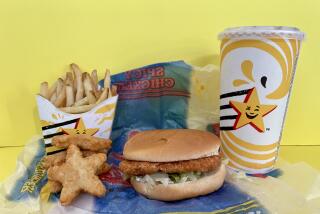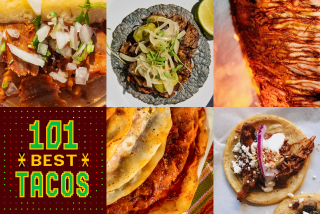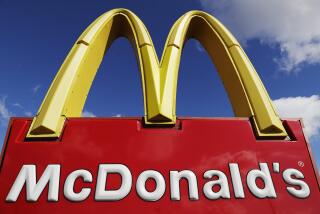Taco Bell Shrinks Some Food Items to Inflate Sales
- Share via
Fast-food executives are hoping to make big sales gains by selling smaller products.
The latest convert is Irvine-based Taco Bell Corp., which on Tuesday announced a national rollout of miniaturized, 39-cent Mexican food items that have been test-marketed in Southern California, among other locations.
In making its announcement, Taco Bell joins Burger King and fellow Pepsico subsidiary Kentucky Fried Chicken in trying to increase traffic with downsized, low-cost menu items. Taco Bell’s new “fiesta size” tacos, burritos and tostadas take just as much labor to create as the regular menu even though they sell for less, Taco Bell officials said. But the chain expects to make up the difference in volume: Test marketing has shown that consumers want to buy more of them at a time since the new products are 40% smaller.
Taco Bell said the national introduction will be backed by a $12-million promotional campaign. Downsized portions have been successful for some chains. Burger King introduced Burger Bundles as a promotional item in the late 1980s, a muffin-sized miniburger modeled on those produced by the famous White Castle burger chain in the East. They proved to be such a hit that Burger King brought back a reformulated version last year as Burger Buddies, selling for 89 cents a pair.
Kentucky Fried Chicken introduced its own downsized chicken sandwich, Chicken Littles, to conquer the snack market. But Janet Lowder, a restaurant industry consultant based in Rancho Palos Verdes, said the introduction met with mixed success. Franchisees balked at having to buy the equipment to assemble them and customers loved them so much that some stopped buying the higher-priced fried chicken buckets.
A Kentucky Fried Chicken spokesman said Chicken Littles, which are still offered, are mainly aimed at the children’s market.
More to Read
Inside the business of entertainment
The Wide Shot brings you news, analysis and insights on everything from streaming wars to production — and what it all means for the future.
You may occasionally receive promotional content from the Los Angeles Times.










